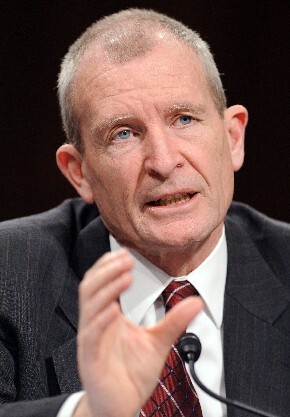hankyoreh
Links to other country sites 다른 나라 사이트 링크
U.S. National Intelligence director affirms North’s space launch

United States Director of National Intelligence Dennis Blair became the first high-ranking official in the United States to announce that he thought the object North Korea is planning to launch is in fact a satellite.
At the Annual Threat Assessment briefing for the U.S. Senate Armed Services Committee on Tuesday, Blair said, “The North Koreans announced that they were going to do a space launch, and I believe that that’s what they intend.” He added, “I could be wrong, but that would be my estimate.”
With the public acknowledgement by Blair, who oversees 16 intelligence organizations in the United States, that North Korea’s launch vehicle is a satellite, some are interpreting this as meaning that the possibilities of an interception by the U.S. have decreased proportionally.
But in the briefing, Blair confirmed once again that he equates a satellite with a missile. With the U.S. administration sticking to the position that the technology is the same for a satellite launch rocket and an intercontinental ballistic missile, the possibility remains that the United States will pursue sanctions even if North Korea launches a satellite, in accordance with United Nations Security Council Resolution 1718 forbidding the launching of a ballistic missile by North Korea.
In response to Blair’s statement, a Cheong Wa Dae official said, “It was not a remark conclusively stating that it is a satellite.” The official added, “Right now, it’s difficult to predict whether it will be a missile or a satellite.”
Another Cheong Wa Dae official noted that Blair used the expression “space-launch vehicle” rather than “satellite” in his response. “It could be a missile or a satellite, depending on whether you load a warhead or a satellite on the space-launch vehicle,” the official noted. This means that a space-launch vehicle does not mean a satellite and is simply an objective expression for a transporter.
Japanese media reported that there is no legal basis for sanctions and no possibility of a successful interception in the event that North Korea launches a long-range missile or satellite. The Yomiuri Shimbun commented Tuesday that the legal basis does not exist if North Korea launches a ballistic missile with range extending far beyond the territorial land and waters of Japan. Asai Motofumi, director of the Hiroshima Peace Institute at Hiroshima City University and a former Japanese foreign ministry official, wrote in the “Comments” section of the Tuesday edition of the Mainichi Daily News that according to the Outer Space Treaty, which states that all nations can explore and use outer space freely and without any discrimination, it is self-evident that North Korea too can exercise these rights.
Please direct questions or comments to [englishhani@hani.co.kr]
Editorial・opinion
![[Column] Has Korea, too, crossed the Rubicon on China? [Column] Has Korea, too, crossed the Rubicon on China?](https://flexible.img.hani.co.kr/flexible/normal/500/300/imgdb/original/2024/0419/9317135153409185.jpg) [Column] Has Korea, too, crossed the Rubicon on China?
[Column] Has Korea, too, crossed the Rubicon on China?![[Correspondent’s column] In Japan’s alliance with US, echoes of its past alliances with UK [Correspondent’s column] In Japan’s alliance with US, echoes of its past alliances with UK](https://flexible.img.hani.co.kr/flexible/normal/500/300/imgdb/original/2024/0419/2317135166563519.jpg) [Correspondent’s column] In Japan’s alliance with US, echoes of its past alliances with UK
[Correspondent’s column] In Japan’s alliance with US, echoes of its past alliances with UK- [Editorial] Does Yoon think the Korean public is wrong?
- [Editorial] As it bolsters its alliance with US, Japan must be accountable for past
- [Guest essay] Amending the Constitution is Yoon’s key to leaving office in public’s good graces
- [Editorial] 10 years on, lessons of Sewol tragedy must never be forgotten
- [Column] A death blow to Korea’s prosecutor politics
- [Correspondent’s column] The US and the end of Japanese pacifism
- [Guest essay] How Korea turned its trainee doctors into monsters
- [Guest essay] As someone who helped forge Seoul-Moscow ties, their status today troubles me
Most viewed articles
- 1[Column] The clock is ticking for Korea’s first lady
- 2Samsung barricades office as unionized workers strike for better conditions
- 3[Editorial] When the choice is kids or career, Korea will never overcome birth rate woes
- 4S. Korea, Japan reaffirm commitment to strengthening trilateral ties with US
- 5[News analysis] After elections, prosecutorial reform will likely make legislative agenda
- 6Japan officially says compensation of Korean forced laborers isn’t its responsibility
- 7[Editorial] As it bolsters its alliance with US, Japan must be accountable for past
- 8[Editorial] Does Yoon think the Korean public is wrong?
- 9Why Israel isn’t hitting Iran with immediate retaliation
- 10[Interview] Learning about the Sewol tragedy through BTS